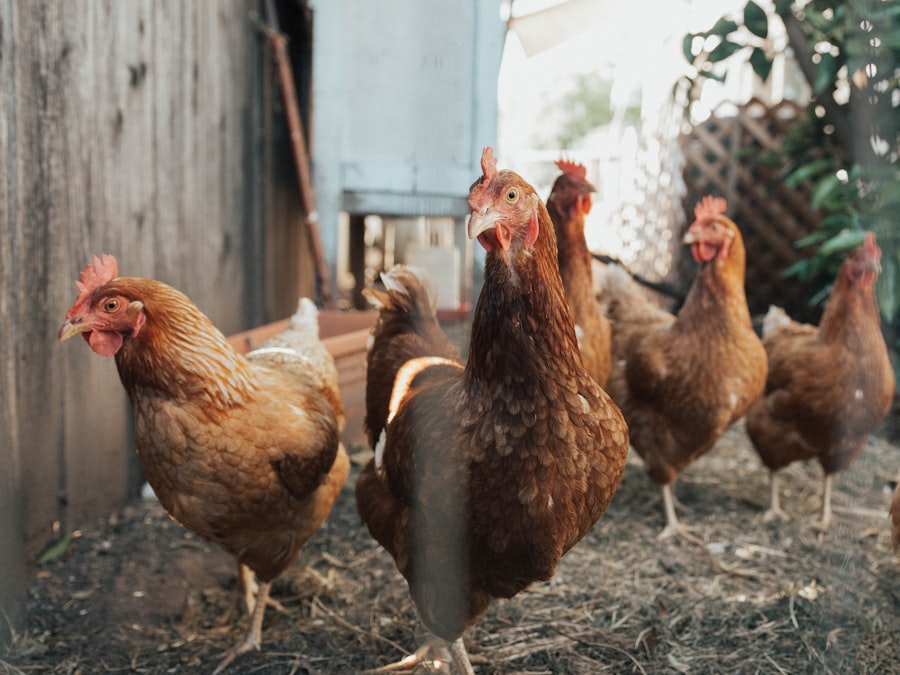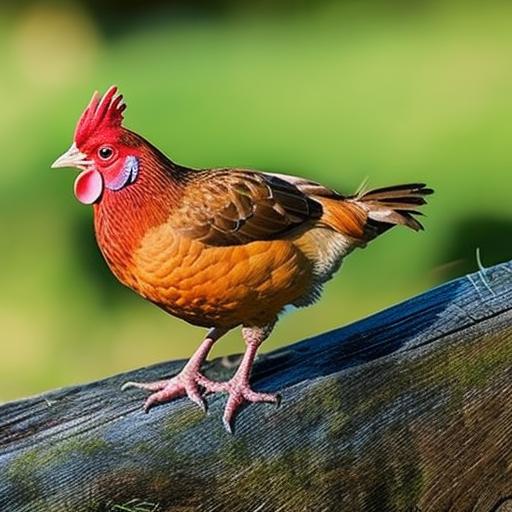Keeping chickens has become an increasingly popular hobby for many people, whether it be for the joy of watching these quirky creatures or for the practicality of having fresh eggs daily. The trend of backyard chicken keeping has been on the rise in recent years, as more and more people are becoming interested in sustainable living and self-sufficiency. In this article, we will explore the benefits of raising chickens, how to choose the right breed, how to prepare and set up a chicken coop, as well as tips on feeding, cleaning, and maintaining the coop. We will also discuss common health issues and diseases that chickens may face, as well as the process of egg production and collection.
Key Takeaways
- Keeping chickens has many benefits, including fresh eggs, pest control, and fertilizer production.
- Choosing the right breed of chicken depends on factors such as climate, egg production, and temperament.
- Preparing the chicken coop involves selecting a location, building or purchasing a coop, and ensuring proper ventilation and insulation.
- Setting up the chicken coop includes adding bedding, nesting boxes, and perches, as well as providing access to food and water.
- Feeding and watering chickens requires a balanced diet and clean water, while cleaning and maintaining the coop helps prevent disease and maintain hygiene.
Benefits of Raising Chickens
One of the main benefits of raising chickens is having a constant supply of fresh eggs. There is nothing quite like collecting eggs from your own backyard and knowing exactly where they came from. Not only do fresh eggs taste better, but they are also more nutritious than store-bought eggs. Chickens that are allowed to roam freely and eat a varied diet produce eggs that are higher in omega-3 fatty acids, vitamin E, and beta-carotene.
Another benefit of keeping chickens is the joy that comes from watching them and their quirky personalities. Chickens are surprisingly entertaining animals with their funny antics and social interactions. They can provide endless entertainment for both children and adults alike.
Additionally, chicken manure is a valuable source of fertilizer for gardens. It is rich in nitrogen, phosphorus, and potassium, which are essential nutrients for plant growth. By composting chicken manure and using it in your garden, you can improve soil fertility and reduce the need for chemical fertilizers.
Choosing the Right Breed of Chicken
When it comes to choosing the right breed of chicken, there are several factors to consider. Different breeds have different characteristics in terms of size, temperament, egg production, and cold or heat tolerance. It is important to choose a breed that suits your needs and the environment in which you live.
If you are primarily interested in egg production, then you may want to consider breeds such as the Rhode Island Red, Leghorn, or Sussex. These breeds are known for their high egg production and can lay up to 300 eggs per year. On the other hand, if you are more interested in chickens as pets or for their ornamental value, then you may want to consider breeds such as the Silkie or Polish. These breeds have unique appearances and are known for their friendly and docile nature.
It is also important to consider the climate in which you live. Some breeds are better suited for cold climates, while others are more heat tolerant. For example, the Australorp is a breed that does well in both hot and cold climates, making it a popular choice for many backyard chicken keepers.
Preparing the Chicken Coop
Having a safe and secure coop is essential for keeping chickens. The coop should provide protection from predators such as raccoons, foxes, and hawks, as well as provide shelter from the elements. When building or purchasing a coop, it is important to use sturdy materials that can withstand the weather and potential predators.
The coop should also have proper ventilation to prevent the buildup of ammonia from chicken droppings. Good airflow helps to keep the coop dry and reduces the risk of respiratory diseases in chickens. Additionally, providing adequate lighting in the coop can help to stimulate egg production.
Setting Up the Chicken Coop
When setting up the chicken coop, it is important to consider the layout and space requirements for your chickens. Chickens need enough space to move around comfortably and engage in natural behaviors such as scratching and dust bathing. As a general rule of thumb, each chicken should have at least 4 square feet of indoor space and 10 square feet of outdoor space.
The coop should also have nesting boxes for the chickens to lay their eggs. These boxes should be dark and secluded to provide a sense of privacy for the hens. Additionally, providing perches in the coop allows chickens to roost and sleep off the ground, which is their natural instinct.
Predator-proofing the coop is crucial to ensure the safety of your chickens. This can be done by using hardware cloth instead of chicken wire, as it is more durable and can withstand attempts by predators to break in. It is also important to secure the coop with locks or latches to prevent predators from opening doors or windows.
Feeding and Watering Chickens

Providing chickens with a balanced diet is essential for their health and egg production. A good quality chicken feed should be the main component of their diet, as it contains all the necessary nutrients they need. There are different types of feed available, including pellets, crumbles, and mash. It is important to choose a feed that is appropriate for the age and breed of your chickens.
In addition to feed, chickens can also benefit from supplements such as oyster shell or grit. Oyster shell provides calcium, which is essential for strong eggshells, while grit helps with digestion by grinding up food in the chicken’s gizzard.
Clean water should be provided at all times for chickens. Chickens need access to fresh water throughout the day to stay hydrated and maintain their overall health. It is important to regularly clean and refill water containers to prevent the buildup of bacteria or algae.
Cleaning and Maintaining the Chicken Coop
Keeping the chicken coop clean is important for the health and well-being of your chickens. Regular cleaning helps to prevent the buildup of droppings, which can attract flies and harbor bacteria. It also helps to reduce the risk of respiratory diseases in chickens.
To clean the coop, you will need a few basic tools such as a rake, shovel, and broom. Start by removing any droppings or soiled bedding from the coop. You can then use a hose or pressure washer to wash down the walls and floor of the coop. Allow the coop to dry completely before adding fresh bedding.
Regular maintenance and inspections are also important to ensure that the coop is in good condition. Check for any signs of damage or wear and tear, such as loose boards or holes in the fencing. Repair or replace any damaged parts to keep the coop secure and safe for your chickens.
Health Issues and Common Diseases
Chickens, like any other animals, can be susceptible to various health issues and diseases. It is important to observe your chickens regularly for any signs of illness or distress. Common health issues in chickens include respiratory infections, parasites, and egg-laying problems.
If you notice any abnormal behavior or symptoms in your chickens, it is important to seek veterinary care as soon as possible. Early detection and treatment can help to prevent the spread of diseases and improve the chances of recovery.
Preventive measures such as good hygiene, proper nutrition, and regular vaccinations can help to reduce the risk of diseases in chickens. It is also important to practice biosecurity measures, such as limiting contact with other poultry and disinfecting equipment and footwear when moving between different areas.
Egg Production and Collection
The process of egg production in chickens is influenced by various factors such as breed, age, diet, lighting, and environmental conditions. On average, a healthy hen will start laying eggs at around 5-6 months of age and will continue to lay for several years.
To ensure a steady supply of eggs, it is important to collect them daily. Leaving eggs in the nest for too long can lead to them being pecked or broken by other chickens. Collecting eggs promptly also helps to maintain their freshness and quality.
Eggs should be stored in a cool and dry place, preferably in a refrigerator. They should be kept in a clean container and should not be washed until they are ready to be used. Washing eggs removes the protective coating on the shell, making them more susceptible to bacteria.
Conclusion and Additional Resources
In conclusion, keeping chickens can be a rewarding and enjoyable experience. Not only do chickens provide a constant supply of fresh eggs, but they also bring joy and entertainment to your backyard. By choosing the right breed, preparing and setting up a secure coop, providing proper nutrition and care, and being vigilant about health issues, you can have a successful and thriving flock of chickens.
If you are interested in learning more about keeping chickens, there are many resources available online and in books. Websites such as Backyard Chickens and The Happy Chicken Coop provide a wealth of information on all aspects of chicken keeping. Additionally, local agricultural extension offices or poultry clubs may offer workshops or classes on raising chickens.
We encourage readers to share their own experiences and tips in the comments section below. Whether you are a seasoned chicken keeper or just starting out, we would love to hear from you!
If you’re interested in learning more about keeping chickens, you’ll definitely want to check out this informative article on creating a garden chicken coop. It provides valuable insights and tips on how to design and maintain a coop that is not only functional but also blends seamlessly with your garden. Whether you’re a beginner or an experienced chicken keeper, this article from Poultry Wizard is a must-read. For more helpful resources on poultry care, be sure to explore their other articles such as “How to Care for Goslings” and “Chicken Coop Nest Box.”
FAQs
What are the benefits of keeping chickens?
Keeping chickens can provide a source of fresh eggs, fertilizer for your garden, and entertainment. They also help control pests and weeds in your yard.
What do chickens need to be healthy?
Chickens need access to clean water, a balanced diet of feed, shelter from the elements, and a safe and secure coop to roost in at night.
How much space do chickens need?
Chickens need at least 4 square feet of space per bird in their coop and at least 10 square feet of outdoor space per bird to roam and forage.
What kind of feed do chickens need?
Chickens need a balanced diet of protein, carbohydrates, and vitamins. Commercial chicken feed is available in different formulations for different stages of life.
How often do chickens lay eggs?
Most chickens lay eggs daily or every other day, but this can vary depending on the breed, age, and season.
What are some common health issues for chickens?
Common health issues for chickens include respiratory infections, parasites, and egg-laying problems. Regular check-ups and proper care can help prevent these issues.
Do chickens need a rooster to lay eggs?
No, chickens do not need a rooster to lay eggs. Hens will lay eggs regardless of whether or not there is a rooster present. However, a rooster is needed if you want fertilized eggs to hatch into chicks.
Meet Walter, the feathered-friend fanatic of Florida! Nestled in the sunshine state, Walter struts through life with his feathered companions, clucking his way to happiness. With a coop that’s fancier than a five-star hotel, he’s the Don Juan of the chicken world. When he’s not teaching his hens to do the cha-cha, you’ll find him in a heated debate with his prized rooster, Sir Clucks-a-Lot. Walter’s poultry passion is no yolk; he’s the sunny-side-up guy you never knew you needed in your flock of friends!







